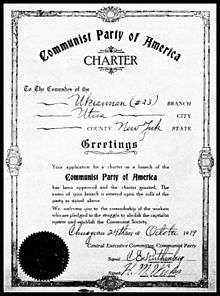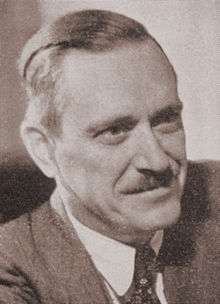Charles Dirba
Charles Dirba (Latvian: Kārlis Dirba; 1887–1969) was a Latvian-American co-founder of the Communist Party of America (CPA) and Communist Party USA (CPUSA).[1]
Background
Kārlis Dirba was born on January 14, 1887. He studied at Kalnciema Pagastskola and later at Riga Polytechnic Institute.[1]
Career

In 1903, Dirba joined the Social Democrats and by 1905 a revolutionary. In 1907, he emigrated to the United States and by 1908 had joined the Socialist Party of America.
In 1919, Dirba was a co-founder of the Communist Party of America (CPA), following negotiations with Alfred Wagenknecht of the rival United Communist Party. He was at the 1922 Bridgman Convention. By the end of 1922, a single Workers Party of America had emerged. In 1928, he served as secretary of the Central Committee of the Party's Latvian Group through 1939. In 1929, he was elected secretary of the Central Committee of the Communist Party USA (successor to the CPA). During the Scottsboro Boys Case, Diba served as assistant secretary of the International Labor Defense (ILD).[2] In 1938, Dirba urged the CPUSA to purge its own members in a manner similar to the Moscow Trials of the Great Purge.[3] In 1946, he became a member of the Los Angeles section of the CPUSA through 1950. In 1947, the Lithuanian-American newspaper Draugas called Dirba "an extremely shadowy figure who is the confidential agent of the all-powerful Comintern in the western hemisphere, according to Igor Gouzenko, former cipher clerk in the Soviet embassy in Ottawa."[4] In 1962, he was a member of the American Latvian Workers' Union through 1969.[1]
Espionage

Historians Harvey Klehr and John Earl Haynes Jr. have argued that CPUSA leaders (e.g., Earl Browder) doubled as either spies or spy recruiters, and they include Dirba among those. They state that Dirba used the codename "Lapin" and "K. Lapin" when sending messages to "Randolph" (which they deem a "generic pseudonym" for American representatives to the Comintern). Specifically, in VENONA document # 39, Lapin tells Randolph that "a food worker here in New York reports that he has overheard Solomon Rechter's brother boasting to somebody else that Solomon Rechter, in Moscow, was carrying on underground work for Zionist 'black shirts'–the Zhabotinsky group." The sender signed off "Comradely yours, K.Lapin, Sec.CCC"[3]
Death
Dirba died age 82 on February 23, 1969.[1]
Works
Dirba served as fourth and final editor of Amerikas Cīņa (Struggle of America) (1926–1934),[5][6] the official Latvian organ of the Workers Party of America and the American Latvian Workers' Union .[5]
- "Letter to the United Communist Party in New York" (1920)[7]
- "Letter to 'Comrade Stepan' in Moscow" (1921)[8]
- "Memories of C.E. Ruthenberg" (1940)[9]
See also
References
- "Kārlis Dirba". Nekropole. Retrieved 17 November 2018.
- Carter, Dan T. (1 September 2007). Scottsboro: A Tragedy of the American South. LSU Press. Retrieved 17 November 2018.
- Klehr, Harvey; John Earl, Haynes; Firsov, Fridrikh Igorevich (1995). The Secret World of American Communism. Yale University Press. pp. 132 (purge), 143-145 (spy). Retrieved 20 November 2018.
- "Former Cleark in Soviet Embassy Exposes Top Communist in N. America" (PDF). Draugas. 4 April 1947. p. 1. Retrieved 17 November 2018.
- Anderson, "Latvians," in Hoerder with Harzig (eds.), The Immigrant Labor Press in North America, 1840s-1970s, vol. 2, pp. 197-198.
- Robert Mirak, "Armenians," in Dirk Hoerder with Christiane Harzig (eds.), The Immigrant Labor Press in North America, 1840s-1970s: Volume 2: Migrants from Eastern and Southern Europe. Westport, CT: Greenwood Press, 1987; pp. 532-533.
- Dirba, Charles (15 October 1920). "Letter to the United Communist Party in New York" (PDF). Marxists Internet Archive. Retrieved 17 November 2018.
- Dirba, Charles (16 April 1921). "Memories of C.E. Ruthenberg" (PDF). Marxist History. Retrieved 17 November 2018.
- Dirba, Charles (1940). "Memories of C.E. Ruthenberg" (PDF). Marxist History. Retrieved 17 November 2018.